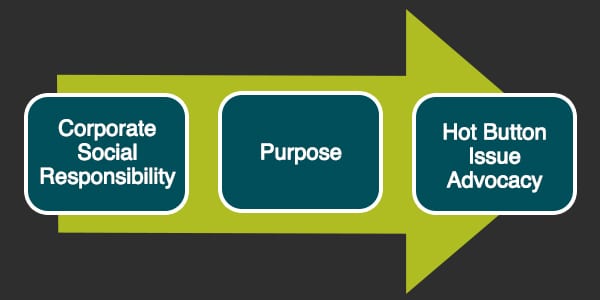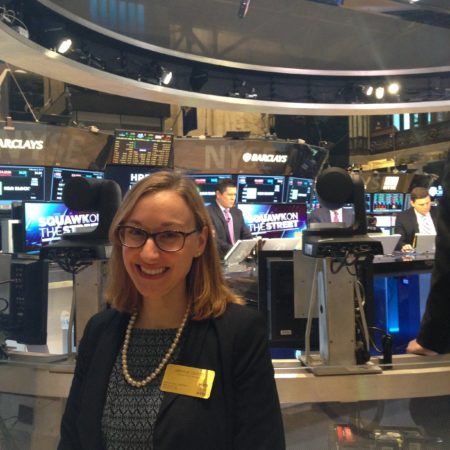In the past eighteen months we’ve seen more and more companies taking stands on social issues: be it proactively making statements on hot-button issues around gender, gun control and equality; responding to consumer pressure to take products off the shelves; or using its advertising might to advocate for social change. Companies are quickly being forced to come to terms with the fact that today’s employees and consumers are demanding that their favorite brands stand for something more than their bottom line.
But not every company is ready to take a stance. There is a spectrum of where companies operate in this increasingly complex landscape of corporate social responsibility.
We see the spectrum as follows…

Where Does Your Organization Fit On The Spectrum?
1. It is rare to find a company today that doesn’t have a Corporate Social Responsibility (CSR) program. This is now a table stake and typically includes corporate philanthropic events and programs, commitments to sustainability in its business and employee volunteerism.
2. A purpose platform takes a CSR program to the next level, where a company aligns itself around a core set of values that sit above the products and services they provide. A successful purpose platform supports the company’s strategic business goals and helps to mitigate risks by institutionalizing a more widespread commitment to deliver on that purpose.
3. There is a new class of companies emerging that are taking purpose to the next level by actively and publicly engaging as participants in advocating for hot-button social issues. These companies are taking proactive stances on issues where they see government and public leadership falling short. This trend has become more apparent since 2016 and may well quickly become institutionalized by corporate America through the recent actions of BlackRock investment firm CEO and founder Laurence D Fink. Fink’s open letter declared that “companies, both public and private, serve a social purpose.”
This new class of companies willing to speak out on social issues is growing, but it’s not without peril to corporate and brand reputation. We’ve seen this work well for companies speaking out on issues that clearly relate to their core business but were also nationally debated issues at the time. For others, the results have been mixed or negative.
There are five critical questions a company – or one of its executives – should ask before it takes a proactive, public approach to inserting the brand into a hot-button social issue:
1. Where does the company currently sit on the spectrum of Responsibility to Advocacy? It’s hard for a company to jump from traditional CSR to social issue advocacy – you have to walk before you can run. In this case, it’s best to start where you are and take incremental steps to the next level. For example, if you have a CSR program that addresses a wide range of issues, it’s a good idea to narrow your focus and define a purpose platform before jumping into a social advocacy stance .
2. Does the program align with the brand and corporate values? Regardless of where you sit on the spectrum, programming of any nature must be authentic to who you are as a corporation/brand, or it will fall flat as greenwashing, pinkwashing, etc. Today’s consumers have set a higher bar than ever before, and will reject companies with their wallets and ambassadorship who aren’t authentic in their approach.
3. Do you understand what matters to your employees and customers? This is important because after all, a business is still a business. Making sure that the company’s activities align to its most important constituent base – its customers – is the linchpin to any CSR, Purpose or Social Advocacy programming.
4. Does your stance align with your internal commitments and policies, or will it highlight a say/do gap? It is always hardest for a brand to be inwardly honest and to recognize and address shortcomings. But a critical examination of these gaps must be done before moving ahead with any kind of social advocacy programing.
5. Does the company/brand have enough reputational equity built up to weather the storm? No program will be without its detractors, but doing an honest assessment of your reputational equity is a valuable step before proceeding with any significant initiative. Understanding the business and political landscape in advance of an announcement will allow you to prepare for negative reactions and to weather the storm – protecting long term business impact.
There is no doubt that the pressure on businesses to be more active in the social landscape will continue to grow. It is critical to take the time now to step back and find your place on the spectrum and build a meaningful short and long term plan to deliver on it.



